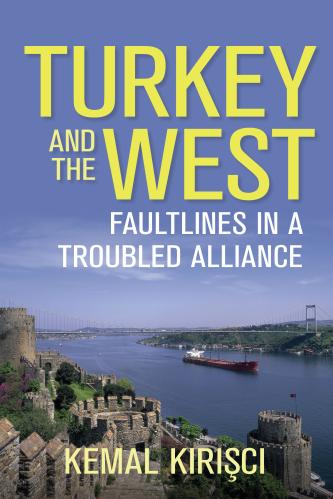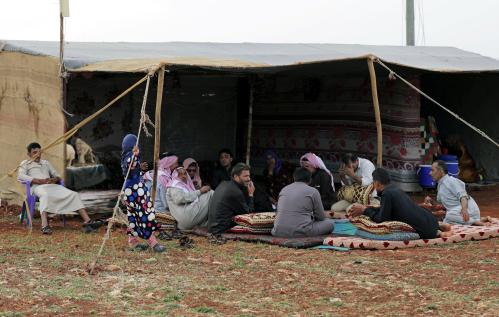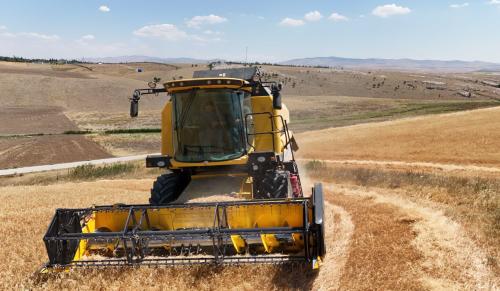This piece is part of a series on refugees in Turkey made possible by support from the Tent Partnership for Refugees. The views expressed are those of its authors and do not represent the views of Tent, their officers, or employees.
Eight years after Syrians began to flee en masse from the growing violence in their country, Turkey now hosts 3.6 million Syrian refugees. For the fourth year running, this makes Turkey the largest host, globally, of refugees.
Neither return nor resettlement are real options for the refugees. They will likely stay in Turkey for the foreseeable future, and it’s time to get serious about creating opportunities for how to formally and sustainably employ them. However, this will not be an easy exercise, and progress will depend on deepening the cooperation between Turkey and the international community, especially the European Union. The 2018 Global Compact on Refugees offers a useful guide for concrete policy options.
The current situation
Most of the Syrians currently residing in Turkey enjoy protection from forced return to Syria as well as access to basic public services including health care and, more recently, public schools. Following the EU-Turkey statement from March 2016, they have also been receiving modest cash support through the Emergency Social Safety Net (ESSN) and the Conditional Cash Transfer for Education (CCTE) programs.
Given that the support they receive from the state is far from meeting their needs, Syrians have been participating informally in the Turkish labor market for some time, as many Syrians living in Turkey do not have work permits. In this context, their participation has been fraught with problems and challenges.
By the numbers: Syrians in Turkey
There are 2.1 million working-age (15-65) registered Syrians in Turkey, but the number of Syrians actively participating in the labor market is unknown, as the informal nature of their employment makes it difficult to know exactly. In the absence of comprehensive data on the labor-market status of Syrians in Turkey, it is estimated that between 500,000 and one million Syrians actually work. Most sources indicate that Syrians are working predominantly in the textile and apparel sectors, as well as in education, construction, services, and especially agriculture. A survey conducted by the Turkish Red Crescent in 2018 showed that 20.7% of the Syrian workers in education are employed in irregular jobs, while this rate increased to 92% for those Syrians employed in the agricultural sector. Informal and irregular employment inevitably come with low wages—well below legally prescribed minimum pay—as well as poor working conditions and exploitation, especially among children and women.
In January 2016, the government began allowing registered Syrian refugees to access formal employment opportunities by making it easier to obtain work permits. However, this has not significantly improved the picture, as only around 65,000 work permits had been issued by the end of 2018, according to the Interior Minister of Turkey.
The obstacles
Beyond the issue of work permits, there are various obstacles to formal employment, some specific to Syrians and others more general.
As Turkish regulations stipulate, work permits cost time and money, and need to be renewed annually. Moreover, there is a six-month residency requirement for application. There is a 10% quota for Syrian workers in a given firm, and this quota applies even if the ownership structure of the firm includes a Syrian. Moreover, the design of the ESSN cash-support program dissuades formal employment, as households are immediately excluded from the program even when just a single member is formally employed.
The structural problems of the labor market in Turkey present further challenges. According to TurkStat, one in every three Turkish workers is employed informally. In other words, high labor costs, relatively high minimum wages, and low skill levels—coupled with slack enforcement—create a dual labor market in Turkey, where informal workers are working under precarious conditions, regardless of their nationality.
Furthermore, lack of language skills and the non-transferability of certain labor market skills exacerbates the problem for most Syrians. Particularly, low levels of education play a role: According to the above-mentioned Red Crescent survey, more than 50% of Syrians surveyed had either no education or only primary-level schooling, which limits employment prospects. For those who do have higher education levels, establishing degree equivalence often stands in the way of formal employment. As a result, many Syrians have to accept job offers for lower wages: For instance, one study found that young Syrians in Istanbul earn 27% less than their Turkish counterparts on average.
Ironically, this also creates lost opportunities for the Turkish economy: 20% of Syrians in Istanbul between 18-29 years of age have a university degree, yet these degrees do not translate into higher wages. A U.N. research team identified at least 125 university-trained Syrian agronomists in Şanlıurfa, for instance, but reported that most of them are unemployed or work in unskilled jobs.
In an effort to promote labor market access, the government has exempted Syrians employed as seasonal workers in agriculture from work permits. However, the agricultural sector offers its own challenges. Most of the current employment is itself informal. Working conditions are notoriously difficult even for local laborers, especially for women and children, not to mention migrants in general. According to the Household Labor Force Statistics by TurkStat, more than 70% of local agricultural wage earners report working in seasonal jobs, and a mere 21% of all wage-earners in agriculture are formally employed. In short, workers in agriculture face low wages, work long hours, and commonly work informally, regardless of their migrant status. Thus, many try to transition into jobs in urban areas and in other sectors.
One final challenge result from the worsening state of the Turkish economy. In 2018, the economy grew by only 2.6%. With more than 700,000 people entering the labor market annually, the unemployment rate soared to 13.7% in March 2019, according to seasonally-adjusted data, following an increase of almost 4 percentage points in a single year. Unfortunately, the Turkish economy is not expected to recover soon. The current growth estimates for Turkey in 2019 calculated by the OECD and the IMF is in the negative. Needless to say, such a grim outlook is bound to aggravate public resentment towards Syrians in Turkey and undermine social peace. In the informal sector, the employment of 10 Syrian men is estimated to eliminate the jobs of four native men (when including part-time work) and forces wages into a downward spiral.
Prospects for a better path
Yet all is not lost. In line with the U.N.’s Regional Refugee and Resilience Plan (3RP Turkey), international agencies such as the U.N. High Commissioner for Refugees (UNHCR), United Nations Development Programme (UNDP), International Labor Organization (ILO), Food and Agricultural Organization (FAO), and International Organization for Migration (IOM) are invested in projects to improve the skill set of refugees and enhance their employability, especially in the private sector. There are also national efforts involving the Directorate General of International Labor, as well as the Turkish Employment Agency (ISKUR) to facilitate access to livelihoods, with a growing emphasis on vocational training, programs fostering entrepreneurship, and tax subsidies to create sustainable employment. Turkish NGOs such as SGDD-ASAM, as well as international ones such as United Works and Spark, also work on placing refugees into formal jobs.
Furthermore, agriculture may emerge as a promising sector for employment opportunities. According to the Household Labor Force Statistics by TurkStat, Turkish agricultural production is dominated by family-owned businesses. Close to 5 million people work on family farms, together with wage-earners amounting to more than half a million, excluding migrants. Yet, as Turkish farmers age and wage-earners move on to non-farm jobs, firms in agriculture encounter growing pockets of labor shortages. Given the difficulty of accessing livelihoods on one side, and the need to find workers on the other, many Syrians find themselves employed seasonally in agriculture. In such a setting, large, export-oriented Turkish companies with a sense of corporate responsibility are expressing interest to train and employ Syrian refugees, offering them a path to sustainable employment.
What the EU can do
An important proportion of livelihood-focused projects to enhance refugees’ self-reliance is already internationally funded, especially by European Union’s Facility for Refugees in Turkey (FRIT). However, FRIT is slated to end in two years, and there are no indications that it will be renewed. Hence, it will be important for Turkey and international stakeholders to develop a long-term strategy to enhance the prospects of integrating Syrian refugees into Turkey’s formal economy. This is particularly urgent since the Syrian refugee population in Turkey is very young and growing by 350 each day (since 2011, by more than 350,000 overall), while the local labor market is challenged to create jobs for almost 4.5 million unemployed Turkish nationals.
The Global Compact on Refugees offers constructive ideas. It calls on the signatories to “promote economic opportunities, decent work, job creation and entrepreneurship programs for host community members and refugees” to support sustainable livelihood opportunities and resilience of host communities by ensuring “inclusive economic growth for host communities and refugees.” It is with this in mind that the EU and Turkey should start formulating a strategy.
Such a strategy could start by exploring the establishment of a Qualified Industrial Zone near the Syrian border, where close to a million refugees live. The region (the provinces of Gaziantep, Kilis, and Sanliurfa) is recognized for its diverse industrial as well as agricultural production. The EU could permit products from this zone as certified, to give firms employing Syrians preferential access to its markets.
Additionally, to incentivize Turkish businesses to employ Syrians formally, the EU could increase quotas on fresh agricultural products that are exempted from import duties, as well as consider lowering such duties for products beyond these quotas. The EU could also unilaterally lift custom duties on the agricultural component of processed agricultural goods covered by the customs union between the EU and Turkey.
Lastly, the EU could encourage large European companies to consider involving fledgling social cooperatives founded by Syrians and locals in their value chains. The benefit of these policy ideas is that they would not require direct funding from the EU, an issue that usually tends to generate resistance from member states, but would be in line both with the letter and spirit of the Global Compact on Refugees. They would encourage economic growth in a manner that benefits both refugees and locals, and could generate a win-win outcome.
The Brookings Institution is committed to quality, independence, and impact.
We are supported by a diverse array of funders. In line with our values and policies, each Brookings publication represents the sole views of its author(s).






Commentary
Syrian refugees in Turkey need better access to formal jobs
July 18, 2019